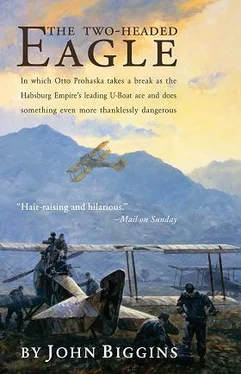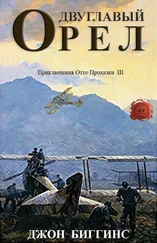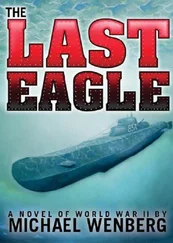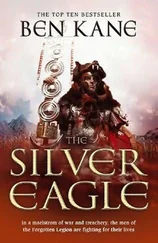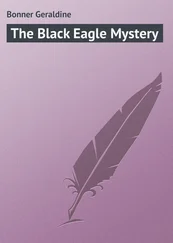We had only just circled back across the ridge when the Skoda howitzer fired its first shot. Even from a thousand metres above it was a spectacle of brute explosive violence that remains with me to this day. I had seen heavy guns fire before, of course: I had been a battleship gunnery officer before the war and still had impaired hearing in the upper registers to prove it. But I had never seen anything quite so big fired before—or been looking almost down the barrel as it did so. It astonished me to see that the shock waves were actually visible, spreading out like ripples on a pond around the great gout of orange and brown which suddenly erupted from the dark forest, making the trees about it flex and thrash as if some localised hurricane had struck them. A few seconds later the blast hit our flimsy aeroplane, making it skip and bounce suddenly like a mountain goat. The enormous shell was just visible for a moment or two as it reached the apex of its flight above the mountain ridge, losing speed before toppling over to plummet down towards its target. I was able to imagine—though with no particular relish—the feelings of the Italian gunners as the express-train roar came rushing down upon them to announce the arrival of the mighty projectile.
It landed on the mountain slope some way above their position. Seen from where I was it looked like the sudden birth of a volcano: a disc of rock and forest floor about fifty metres across, suddenly heaving itself into the air as though a giant mole were stirring beneath it, then belching forth a great cloud of yellowish smoke as full-grown pines flew into the air like so many matchsticks. When the smoke cleared I saw that a hole the size of a small quarry had been excavated in the valley side, surrounded by a chaos of fallen trees and a circle of shattered rock. I marked the crater on my map and signalled “K200 L300” to indicate that the shot had fallen two hundred metres too short and about three hundred metres too far left of the target. Meanwhile the slopes below me broke out into a rash of flashes and smoke clouds as the Italians recovered from their shock and, realising what was afoot, let fly with every gun available to try and find the perpetrator of this outrage. The telephone lines down from the ridge of the mountain must be glowing red, I thought, as the Italian spotters signalled back the position of the muzzle-flash from our gun.
They began to make it uncomfortably hot for us, now that they had realised what we were up to flying in slow circles over the mountain. A desultory spatter of rifle fire had greeted our first appearance—Italian infantrymen in their rocky trenches relieving the boredom of yet another day in the line by loosing off a few shots at a passing aeroplane. But now the shooting began in earnest: machine guns coming into action, then a flak battery in the valley sending shells up at us. I signalled to Toth to take us higher. Meanwhile the Italian howitzer battery fired a salvo. The shots were well short of our gun, and loosely grouped, but the line was worryingly accurate. By now the Italian outposts up on the ridge must be taking compass bearings to fix the hidden Skoda’s position. Like us, they knew that down there among the trees men were cursing and sweating as they struggled to hoist the enormous shell into the still-hot breech, then swinging the ponderous breech block into place and locking it shut before cranking furiously at the elevation wheels to raise the mighty barrel skywards once more.
Our second shot fell even further short than the first, dropping right into the bed of the torrent that ran down the mountain valley. I suppose that there must still be a miniature lake there, interrupting the course of the stream and providing puzzlement for the area’s natural historians. I like to think that, now the trees have grown back around it, the village children from Caporetto go up there to fish and to swim on summer afternoons, unaware of the events that took place in that quiet valley when their great-grandfathers were young. I signalled back “K300” as we banked away once more to await the Italian reply. Neither contender could move of course: the Italian howitzers, though (we understood) mounted on wheels, would have taken several hours to dig out of their emplacements and haul away. As for our Skoda weapon, it was concreted into its emplacement and could only be released with the aid of blasting charges and pneumatic drills. Neither contender could do anything more than await the enemy’s riposte. It was like watching some bizarre medieval duel to the death, prescribed perhaps in a fable to establish which suitor would have the hand of the princess; the two opponents with their feet set in tubs of mortar and taking turns to lunge at one another through a paper screen, their thrusts guided only by the calls of the spectators in the gallery.
The Italians fired a second salvo after three minutes or so, just as we were coming back over them. It was more closely grouped this time, and it landed only four hundred metres or so from our gun. Meanwhile our third shot went wide again: two hundred metres over and one hundred too far right. Damn them, what was wrong with our gunners this morning? Heavy artillery shooting was never an exact science: shot falls varied because of wind and air density and the precise chemistry of each propellant charge—and by 1916 Austrian cordite was becoming very uneven in quality. But even so their shooting was not up to the usually high standards of the Imperial and Royal Artillery. Did they realise what peril they were in? At this rate it was more than likely that the Italian battery would find them before they found the Italians.
Watched from my position, four hundred metres up in the singing cold air, there was something dreadfully, sickeningly fascinating about observing this duel of monsters taking place below us: watching the great flashes that shook the trees and the sudden plumes of smoke, feeling the aeroplane shudder around us as the shock waves reached it. Sitting there like some indifferent god, tapping the Morse key and pencilling crosses on the map, it was only too easy to forget that in a few minutes one battery or the other would be reduced to a smoking pile of twisted steel, smeared with the blood and entrails of perhaps fifty of my fellow-men. What would happen if the wireless broke down, or if the Italian flak gunners managed to knock us out of the sky? We had been at this for some ten minutes now. The Italians were well up in wireless and might soon contrive to jam our signal. The terrible iron logic of war had taken over. Down there was a large number of young Italian soldiers who had never done me the slightest harm and whom I would cheerfully greet as friends if I met them in some cafe. Yet here I was, bending all my efforts to secure their deaths as if we had always been the most mortal of enemies. Sitting here in an armchair it sounds completely insane; but up there that morning a lifetime ago it made chilling sense.
In the end it was them and not us. The Skoda gun’s fifth shell landed just on the edge of the hundred-metre circle within which I judged a shell- burst would put the battery out of action. After that, things happened with bewildering rapidity. The smoke dispersed in the breeze to reveal a patch of devastated forest. But then a confused series of flashes and spurts of fire began to spread through the still standing trees. I suppose that it was the usual story: that in his haste to load and fire the battery commander had allowed too many propellant charges to accumulate on the lines, so that the flash of one catching fire set off the next in a powder-train which finally led back to the ammunition dump. I hope that some of the Italians survived, crouching terrified in their slit-trenches as the world exploded about them. But somehow I doubt it: not when I saw the entire ponderous carriage of one of the howitzers being tossed into the air as casually as a child’s toy. Within a few seconds a vast ochre-coloured cloud of smoke was boiling into the summer sky like some obscene toadstool. By the time we were safely back over our side of Monte Nero it must have been visible to the Austrian gunners down in their emplacement, deafened and dazed with muzzle-blast despite their padded helmets. I tapped the signal “V” on the Morse key, then followed it in a fit of patriotic exultation with a display of white and red rockets and the message “V-I-V-A-T.” Our mission had been accomplished.
Читать дальше
